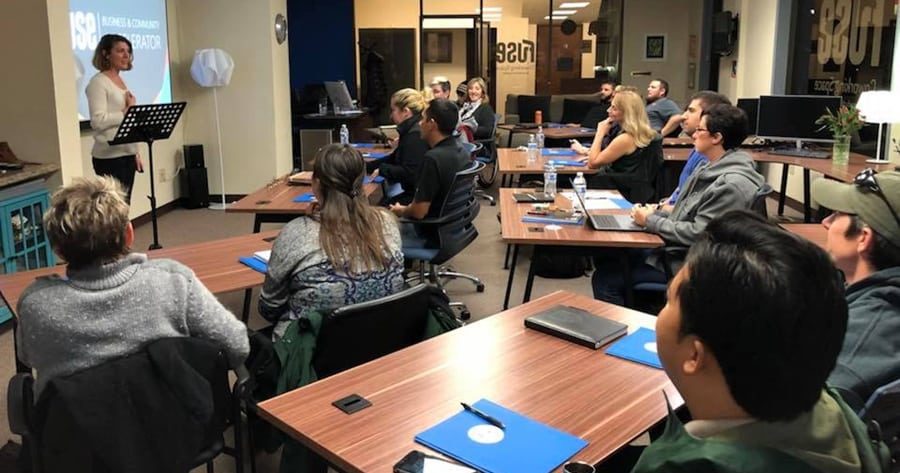
Home » Fuse offers collaborative space for angel investors, entrepreneurs to meet
Fuse offers collaborative space for angel investors, entrepreneurs to meet

February 15, 2018
It’s hard to start a business on optimism alone.
Brett Spooner, an attorney with Gravis Law PLLC in Richland, said what makes it even more difficult is that entrepreneurs are limited when it comes to soliciting the capital they need to get their businesses off the ground.
“The goal of the Security and Exchange Commission (S&E) is to protect people from getting tricked into buying bad stocks — into buying securities — without understanding the risks. So in order to sell to non-accredited investors, you have to file documents with the S&E that, if someone is not accredited, you’ve given them all the information they need,” Spooner said. “It’s a really dangerous spot for early-stage companies to be in. We’ve made it really hard for companies to raise capital.”
An accredited investor must have earned income that exceeded $200,000 (or $300,000 together with a spouse) in each of the prior two years, or have a net worth over $1 million — either alone or together with a spouse, according to the S&E Commission.
This excludes the value of the person’s primary home and any loans secured with the residence.
Spooner said often investors and entrepreneurs simply overlook each other.
“You’ll hear it many times, ‘There’s nothing to invest in the Tri-Cities,’ and then they’ll go to Seattle or somewhere else,” he said, adding that the same is true on the other side of the fence. “You’ll hear, ‘No one’s investing.’ ”
To enable the two sides to meet more frequently, Spooner helped found Fuse to grow and support small businesses, freelancers and cultivate a community of economic development from a grass-roots level.
Fuse is a Richland-based co-working community.
“We’re trying to create ways for companies and investors to run into each other. (At Fuse) we’re providing education and opportunities for (startups) to pitch and launch ideas. And most of this opportunism comes through networking and matchmaking,” he said. “It’s merely a presentation of the company, not a ‘Hey, give me $50,000.’ It’s ‘Hey, here’s our company. Here’s what we’re doing.’ And if an investor decides to talk to the company, now the investor has approached the company.”
In the case of emerging businesses, Spooner said the owner might need a prototype to try to prove their business idea merits further investment — which can be expensive.
“That first $10,000, $50,000 or $100,000 can come from maxing out credit cards, borrowing from friends and family, or taking money out of savings. That initial money is typically from friends and family,” he said.
Angel investors are the next step and are sometimes referred to as seed investments. Statistically, Spooner said, angel investors provide $150,000 to $250,000 of capital funds, depending on the business.
“Typically angel investors are investing in equity,” Spooner said. “Sometimes it’s under a convertible note. Often in this stage, maybe five angels put $25,000 in.”
Many angel investors have a budget and a process for investing, he said. Spooner said he invests in five to 10 businesses a year. One local business he’s involved with is Humming Hemp, a food company founded in spring 2017 that creates hemp foods packed full of protein and omega.
The company’s products are hitting retail shelves in Safeway and Albertsons stores across the state, but not every investment story has a happy ending.
Angel investments are often high-risk, and Spooner said statistically one or two of every 10 businesses will make money.
“In the angel investor round, one of the hardest things you can do is value the company because you don’t have revenue. Usually the value is based on a revenue model. If a company isn’t making money or doesn’t have assets, it’s really hard to value. So what angel investors are looking at are formulas to understand a potential value,” he said, although that doesn’t prohibit investors from taking risks. “There’s tax strategies involved. A lot of investors like to do enough deals each year so their early losses offset the other investment gains.”
And while there’s no revenue stream to examine with startups, Spooner said there are several areas of interest to look at for a potential investor. For instance, they’ll want to learn more about people on the business team, examine prototype and consider the market potential, he said.
“There’s a big difference if you’re selling a product to the whole world or an auto repair shop,” Spooner said, who suggests startup owners attend events where they can network and strengthen their business plan.
A lot of angel investors are comfortable with real estate projects, agriculture and areas that are easily understood, with assets that can be collateralized against any losses. However, these days Spooner has seen an interest grow in innovative science, software technology, renewable energy, artificial intelligence and applications that integrate smart homes and machine learning.
“I invest in a lot of tech,” Spooner said. “I’m always looking for the next great software companies.”
Fuse runs anywhere from five to 30 events a month toward entrepreneurship, and Spooner encourages startup owners and potential investors to stop by the new office at 723 The Parkway in Richland or online at fusespc.com to learn more.
Local News Banking & Investments
KEYWORDS february 2018





